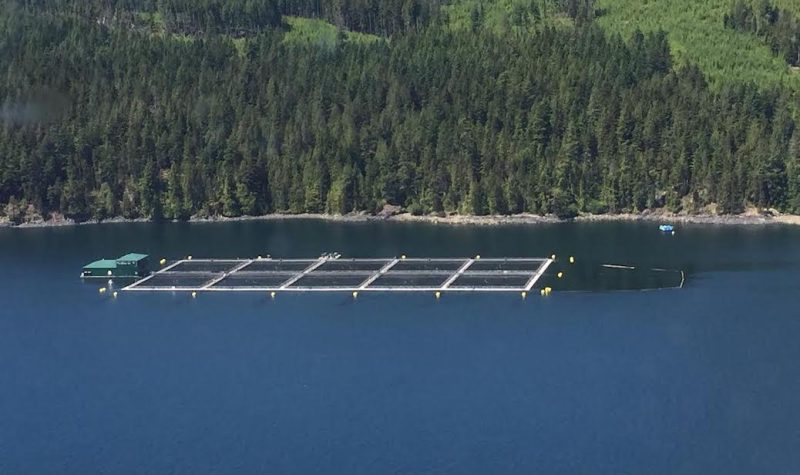By Roy L Hales
The Pacific Salmon Foundation (PSF) supports the DFO’s decision to remove open net fish farms from the Discovery Islands.
Towards a new Aquaculture Act
On January 14, 2021, the foundation made a formal submission to DFO’s consultation regarding the creation of a new federal Aquaculture Act. The Pacific Salmon Foundation stressed the need for the new Act to acknowledge the protection of wild Pacific salmon and their ecosystems as the first priority of the federal government, and that all aquaculture proposals must meet the requirements of the Fisheries Act. They also support First Nations involvement in aquaculture decisions, application of the precautionary principle, and need for science to minimize interactions between aquaculture and wild fish populations.
In this morning’s interview Dr. Andrew Bateman, explains that it is very unusual for the scientists in this Vancouver based non-profit organization to take such a strong position and he explains why.

Dr Andrew Bateman, Salmon Health Manager, Marine Science Program, Pacific Salmon Foundation - courtesy Dr Andrew Bateman
Transitioning from open net aquaculture
“There’s been no formal risk assessment of salmon farming in BC on wild BC salmon,” said Bateman.
In the podcast above, he mentions “pieces of evidence that come from different researchers, different fields and different risk assessments.” These consist of reports on: the impacts of sea lice; potential impacts from viruses and bacteria coming from salmon farms; “the patterns of infection.”
The PSF is concerned about the vulnerability of juvenile salmon, and returning adults, as they pass the fish farms during their migrations.
“Combined, these lines of evidence are what has led to take a position on open net aquaculture. This is quite a rare event for PSF. We tend not to take positions on issues. It is the strength of evidence that we see on these multiple fronts that leads us to conclude … that salmon farming in British Columbia needs to transition from open net aquaculture to something else that is better for wild salmon,” explained Bateman.
He added, “That may ultimately be to on-land aquaculture, or some other form of closed containment. The details have yet to be worked out.”
Why the DFO’s findings of minimal risk are insufficient
Bateman pointed out that the DFO’s recently publicized findings that fish farms in the Discovery Islands pose minimal risk to migrating salmon, focus on the sockeye salmon migrating up the Fraser River.
“No group has performed any kind of risk assessment that would allow anyone to say there is minimal risk to salmon in general. Based on the findings coming out of the PSF’s Strategic Salmon Health Initiative (SSHI), we really believe there is cause for more concern, for more careful consideration of the existing evidence and the collection of new pertinent evidence. While that is going on, even a judiciously moderate application of the precautionary principle demands that we transition salmon aquaculture away from open net pens and towards something that is going to be better,” said Bateman.
There are several reasons why the Pacific Salmon Foundation does not agree with the DFO’s announcement:
- “There was a failure to consider sea lice at all. The risk assessments focused on infectious diseases and not parasitic sea lice.”
- “There was a failure to consider any kind of cumulative impact assessment, even across those pathogens that were considered.”
- “We have deemed that there was inadequate consideration of uncertainty in these risk assessments. That includes the lack of consensus among experts that took part.”
- “There has been a failure to correct some key errors in at least one of the risk assessments.”
- “The risk assessments are already out of date. Since the conclusion of the risk assessment processes, new evidence has come to light - some of it from the Strategic Salmon Health Initiative.” (SSHI)
The Pacific Salmon Foundation
This broadcast was taken out of a much longer interview which Cortes Currents has opted to broadcast in segments.
The Pacific Salmon Foundation first announced their opposition to open net salmon farming on May 9, 2018.
Scanning through some recent scientific papers, Cortes Currents found that Dr Bateman and other scientists from the Pacific Salmon Foundation co-author with scientists from the DFO’s Department of Molecular Genetics in Nanaimo, the University of Toronto’s Department of Ecology and Evolutionary Biology and UBC’s Department of Medicine - to name a few institutions.
Dr Bateman was the lead author of a paper called Descriptive multi‐agent epidemiology via molecular screening on Atlantic salmon farms in the northeast Pacific Ocean, that was published in 'Nature' last month.
Links of interest:
- The Pacific Salmon Foundation website
- PSF Submission, Federal Aquaculture Act Consultation Jan 14 2021
- (PSF) Strategic salmon health initiative
- Dr Andrew Bateman’s website
- (Nature) Andrew W Bateman et al, Descriptive multi-agent epidemiology via molecular screening on Atlantic salmon farms in the northeast Pacific Ocean
- (Virus Evolution) Gideon J. Mordecai et al, Discovery and surveillance of viruses from salmon in British Columbia using viral immune-response biomarkers, metatranscriptomics, and high-throughput RT-PCR
- (The Royal Society) Dylan Shea et al, Environmental DNA from multiple pathogens is elevated near active Atlantic salmon farms
- (CBC) New study suggests fish farms raise risk of exposure to infectious disease for wild B.C. salmon
- (Cortes Currents) articles about or mentioning the Pacific Salmon Foundation
- (Globe and Mail) Scientist at Department of Fisheries and Oceans says Ottawa is to beholden to fish farm industry



